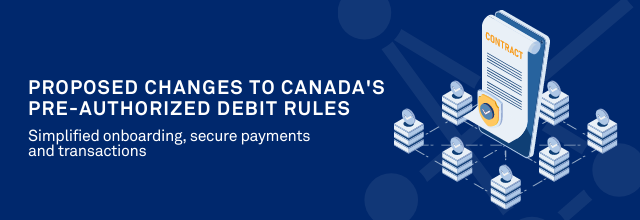Pre-Authorized Debits (PADs) can be the most efficient and cost-effective way for consumers and businesses to make certain payments such as a mortgage, utility, membership dues, and insurance.
Payments Canada recently proposed several amendments to the Pre-Authorized Debits Rule, last reviewed in 2008. With the increasing level of technological advancements and market demands of Canadians who want greater flexibility and choice of Payment Service Providers (PSPs), Payments Canada is proposing changes to the PADs Rule to meet these evolving needs.
You can read about all suggested changes to the PAD rules here.
Some of them are:
- clear definition of “Commercially Reasonable” for the purpose of verification;
- reduce confusion between Paper and Electronic Agreements and replace with one PAD Agreement;
- automatic termination of the PAD Agreement when a contract for goods and services is cancelled;
- clarify information requirements when outsourcing PAD processing to Payment Service Providers.
We commend Payments Canada for reviewing its PAD rules, especially those around clearing and settlement. The organization’s rules must remain relevant and meet the needs of payors, payees, and PSPs like Telpay.
These proposed amendments do not fully address the operational challenges facing businesses when it comes to PADs:
- Failed payments and recourse;
- Overly burdensome onboarding and compliance;
- Need for faster payment processing time;
- Verifying the banking information of some payors.
Payments Canada has proposed amendments that could help solve some of these issues. Still, others could use more attention, such as the amendment, to rightly eliminate the potential for PADs to exist in perpetuity after a service agreement has ceased. Yet, it doesn’t mention anything about expiry dates for PAD agreements.
What do we want to change?
We have provided the following feedback to Payments Canada:
- Ensure the procedure for reversing PADs does what it’s intended — mitigate fraud. It should be the payor’s responsibility to prove that a PAD is unauthorized. If it is unauthorized, the return period should be no more than five days for businesses and 30 days for personal PADS.
- Clarity around verifying banking information in client-not-present situations.
- Notification changes clarity; we believe that notice periods should be eliminated if agreed upon between the parties. It would significantly speed up the processing time for PADs.
- PAD agreements should have expiry dates if agreed upon by the parties. The amendment that would eliminate the possibility of PADs existing after service agreements end is good. However, there could be cases where a payee wants a service agreement to remain in place but wishes to have a PAD terminated or only exist for a defined term.
As mentioned, PADs can be the most efficient and cost-effective way to pay bills if these rules encouraged streamlined onboarding, rapid and guaranteed payments, and secure transactions.
How can you help?
If you support and want to foster a vibrant competition in the PAD service marketplace, these amendments may not accomplish that.
Here’s an opportunity to voice your feedback to Payments Canada proposed PAD Rule changes at consultation@payments.ca or 613-238-4173.

